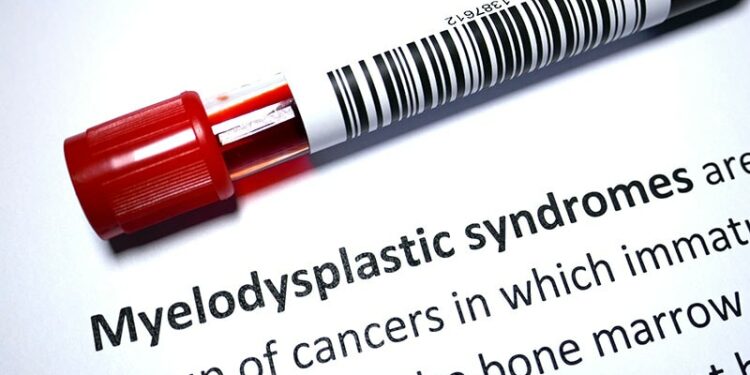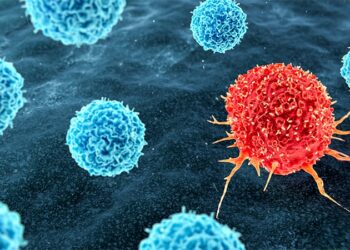SAN DIEGO — A new study linked longer duration and deeper intensity of tobacco smoking to more genetic mutations in myelodysplastic syndromes (MDSs), a group of bone marrow cancers that are similar to acute myeloid leukemia.
The prospective National MDS Natural History Study evaluated 1898 patients with recently diagnosed or suspected MDS. An adjusted analysis linked higher number of pack-years to more mutations (P = .006), with those at the 90th percentile with 3.5 times the number of mutations as nonsmokers, researchers reported at the American Society of Hematology (ASH) 2024 Annual Meeting.
The findings “suggest that smoking potentially contributes to the multistep molecular genetic pathogenesis that ultimately results in diagnosis of the cancer,” said corresponding author Mikkael A. Sekeres, MD, of the Sylvester Comprehensive Cancer Center, University of Miami Health System, Miami, at a news briefing. “The more you smoke, the more likely you are to acquire more mutations and even develop a higher risk of myelodysplastic syndromes. [More smoking] was also associated with progression and survival.”
While numbers are uncertain, an estimated 10,000 or more people in the United States each year are diagnosed with MDS, also known as preleukemia, according to the American Cancer Society. Median survival ranges from 1 to 10.6 years based on risk group, although the cancer society says the statistics are dated and mainly from Europe.
Multiple studies have linked smoking to MDS. The new study aims to understand the possible effects of smoking on genetic mutations.
The research analyzed 1898 patients enrolled from 2016 to 2023 (52% who had ever smoked; 18% current smokers; mean smoking years, 29.8 ± 16.9 years). The patients had diagnoses of MDSs, MDS/myeloproliferative neoplasm overlap, or precursor conditions such as clonal cytopenia of undetermined significance (CCUS).
Smokers were more likely than nonsmokers to be men (68% vs 54%; P P
After adjustment for confounders, smokers had more average mutations linked to MDS than nonsmokers (2.0 vs 1.4; P = .04). Those at the 75th percentile of pack-years had 1.8 times as many MDS-linked mutations as nonsmokers.
The 5-year cumulative incidence of disease progression was higher in long-term smokers than in nonsmokers and those with shorter smoking history (mean proportion progressed, 20+ years vs P
Also, overall survival was lower in smokers than in nonsmokers for patients with CCUS (hazard ratio [HR], 1.91; 95% CI, 1.03-3.55; P = .04) but not for those with MDS (HR, 1.21; 95% CI, 0.53-1.30; P = .41).
“The data suggests that a patient with a new diagnosis of MDS who also smokes should be counseled to stop smoking,” Sekeres said.
This may seem counterintuitive to patients, he acknowledged. When Sekeres was a medical student, he recalled, he counseled a female patient with advanced lung cancer to quit smoking. “The patient looked at me like I had three heads and she said, ‘Why should I stop smoking? The cats are already out of the bag. I have lung cancer.’”
But the new study points to a possible benefit from quitting smoking while sick. “It appears that smoking contributes to the acquisition of new genetic mutations that can lead to worsening of the myelodysplastic syndromes and even evolution of the cancer into acute myeloid leukemia,” Sekeres said.
He added: “One thing to understand about these cancers of the bone marrow is they can take years or decades to develop. They’re not one-hit wonders,” he said. “Smoking caused very specific genetic mutations. The cool part of this is that they’re the same genetic mutations smoking has been shown to cause in cancers like lung cancer, so we’re seeing consistency across cancers.”
Sekeres said he himself will counsel patients with MDS or acute myeloid leukemia to stop smoking. “If there’s anything we can do to intervene to prevent myelodysplastic syndrome from evolving into acute leukemia, my word, I sure I’m going to try it.”
In an interview, Peter Greenberg, MD, professor of medicine at Stanford Cancer Center, Stanford, California, who’s familiar with the study but didn’t take part in the research, said the study suggests that smoking in MDS isn’t just related to exposure to fumes “but appears to be a much more widespread problem” related to its impact on generating hematologic stem-cell mutations.
Most clinicians don’t warn patients with MDS about the dangers of smoking because they’re not aware of tobacco’s connection to the disease, Greenberg said. But there’s another reason to bring up smoking, he said: It boosts the risk for cardiovascular disease, which may be partially responsible for decreased survival in smokers.
Sekeres disclosed ties with Kurome, Schrödinger, and Bristol Myers Squibb. Other authors reported multiple and various relationships with industry. Greenberg had no disclosures.
Randy Dotinga is an independent writer and board member of the Association of Health Care Journalists.
Source link : https://www.medscape.com/viewarticle/smoking-linked-more-genetic-havoc-mds-2024a1000mpe?src=rss
Author :
Publish date : 2024-12-10 10:19:39
Copyright for syndicated content belongs to the linked Source.














